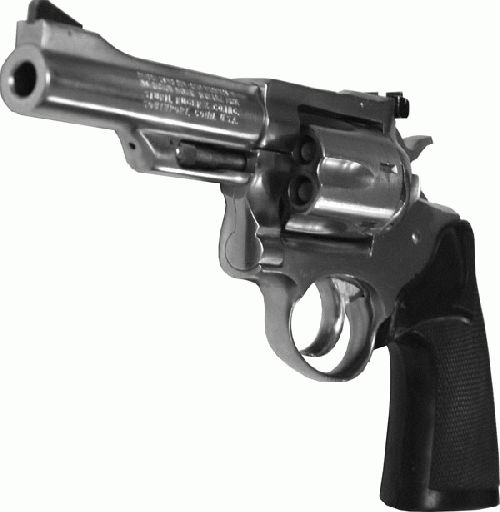Monday, September 23rd, Frank Michel wrote an Op-ed entitled, "Gun control is not an option . . . it is a necessity to save lives!" As is the case with most gun control proposals, it begins with the obligatory claim of "supporting the Second Amendment," and then quickly insists that we need to create "sane gun policy." Mr. Michael specified what he feels qualifies as such: "ban the rapid-fire assault rifles and add-on clips"mandatory background checks at all venues where guns are sold, a 30-day waiting period, and a national database for gun ownership." Enacting all of these, he insists, will "retain the right of the individual to have a gun for personal protection, for sport, and even for collecting."
If you didn't know anything about guns, crime trends and gun
politics, this might seem like a reasonable proposition, but does it really
pass the "common sense" test? Let's
examine these ideas one by one.
First, "rapid-fire assault rifles" are already illegal. These military weapons have a select-fire
switch on the side that allow them to change from semi-automatic mode (one shot
per trigger pull) to fully automatic machine gun mode (keeps firing while
trigger is pressed). Very special
licensure is needed to sell, own or possess such a weapon and, as a result,
they're almost never used in a crime.
These guns are not the ones used in Aurora, CO or in Newtown, CT. Where the confusion comes in is that these firearms
look a lot like the civilian AR-15 rifle, legally available only in a
semi-automatic version. They are no more
deadly, powerful or accurate than many legal sporting and hunting guns.
Politics has also been injected into the conversation here, in
the form I refer to as "politricks." Groups
whose stated goal is to ban private gun ownership concocted the term "assault
weapon" (which, unlike "assault rifle" had no real definition) to confuse the
public into supporting such bans. Their
current target, the AR-15, is the most popular, widely used sporting, hunting
and defensive rifle in the U.S. market. The
proof of their deception is on full display at the Violence Policy Center
website. They write, --The weapons'
menacing looks, coupled with the public's confusion over fully automatic
machine guns versus semi-automatic assault weapons--anything that looks like a
machine gun is assumed to be a machine gun--can only increase the chance of
public support for restrictions on these weapons. In addition, few people can envision a
practical use for these weapons." (See
it for yourself here.)
So-called "assault weapons," are but a small subset of all rifles,
and rifles only
account for about 4% of all murders using guns . When the basic premise, then, is either
misinformation at best, or an outright lie at worst, and the target of the
attack is on such a rarely used set of firearms, can we really call it "common
sense?"
To let you know where I'm coming from, I've been a gun owner
for most of my life -- more than 40 years now.
I'm also a CCW permit holder and sport shooter. I'm the first to agree that we need to do more
to curb violence of all kinds, especially where guns are used. In fact, we have made significant
progress! Despite the advent of the
24/7, 365 news cycle, actual violent
crime has dropped by half over the past two decades or so. This, at the same time the number of guns in
circulation has increased by over 100 million, according
to some estimates, putting enough guns in private hands to arm more than
eight of every ten Americans. If Mr.
Michael's assertions are correct, then how can this possibly be?
The fact is: it can't.
Responsible, law abiding citizens are a great deterrent to crime, and
the legal CCW movement that has swept the nation is one major reason for the
improvement. What goes unmentioned and
unnoticed is that there is a major gap between the aforementioned group --
traditional American "gun culture" -- and gang/criminal culture. Drive-by shootings are not being caused by
roving bands of angry NRA members. Tolerance
of gangs, looking the other way when a drug house opens up in a neighborhood, ignoring
pimps and prostitutes running neighborhood streets are all factors in increased
violent crime. When calls for new gun
laws go out, these are the very people who will feel NO impact! The new laws will only burden the law abiding,
disarming them or worse.
Back to the list, one example of "worse" is the proposed "mandatory
background checks at all venues where guns are sold." This is already the law for legal FFL
(Federal Firearms Licensed) dealers, whether they're at gun shows or in a
traditional store. The recent debacle
centered on private sales, most of which don't take place at a gun show! Gun control proponents were beside themselves
when a recent bill was rejected that supposedly would've solved this
problem. Those who understand gun
politics knew better. The new law was
very poorly written, with sloppy language that would've let most of the private
sales still go unchecked, and it was done for political reasons.
Rather than focusing on safety, the focus was on discouraging
gun sales by adding fees to privately sold guns: a de-facto tax. So, for instance, if you had a gun for sale
and your neighbor wanted to buy it, you'd both have to go to a gun store for
the owner to run a check. Much like taking
a fresh cut of steak to a restaurant and asking the cook there to prepare it, FFLs
don't see this as fair. To them, a
private seller is competition, costing them a sale. Also, shuffling paperwork takes up their
time, which is valuable, so they will add a fee of $25 to $50 for their
"trouble." Imagine if this was true when
selling your car to a friend or your teenage son: you'd take it to the local
car dealer so that they could mess with all of the paperwork, and even though
you're only transferring the car to your son for a dollar, the dealer will want
a $200 fee! Suddenly it's not such a
bargain.
The Coburn
Amendment proposed, instead, that the NICS (National Instant Check System)
be put online for everyone to use. Gun
sellers could run and print background checks of their own, anywhere, with a
computer, tablet or mobile phone. ALL
sales, no matter where they took place, would then be checked, without any of
the fees. Gun ban forces insisted that the
fees and registration be retained, so the entire bill failed. True gun safety lost in the name of all or
nothing politics.
During the Clinton presidency, a 5-day waiting period was
eventually replaced by the NICS check system.
Waiting periods are problematic.
While some see them as a "cooling off period," the scenario of an angry
person going out, buying a gun and instantly using it is a rare one. The average age of a gun recovered from a
crime scene is between 6 and 13 years, depending on the state. If this wasn't reason enough to dismiss the
idea, the stories of women involved in rancorous divorce proceedings being
killed by violent partners was more than ample.
The above 30-day waiting period seems arbitrary and even worse. I don't see gang members giving it much
thought, and as Dr. Martin Luther King Jr. said, "A right delayed is a right
denied."
Now it's time to ask ourselves if the last proposal, "a
national database for gun ownership," qualifies as sensible. Giving the government a list of every gun
owner in America telling them who owns what type of guns(s) and where they're
kept has absolutely no utility for crime prevention. As gun control proponents like to say, "we
register cars," but it fails to prevent accidents or other crimes on
wheels. Registering cars is mainly done
to return stolen cars to rightful owners, yet many police departments have a
policy against returning any guns for any reason. You might logically ask, then, if a registry could
be useful in solving a "gun crime," and again, the answer would be no, it
cannot. Such registries have been tried
in several states, and after amassing millions in cost overruns and hogging-up
tremendous manpower resources, only a paltry handful of crimes were ever solved. I know of no program that is still
active. Even Canada abandoned its plans
for a long
gun registry after wasting millions in taxpayer dollars.
Still, all of this is not the biggest objection to a
registry! President Lyndon Johnson said,
"You do not examine legislation in the light of the benefits it will convey if
properly administered, but in the light of the wrongs it would do and the harms
it would cause if improperly administered."
History is always the best predictor of the past, and we have many
accounts of government registries being used to facilitate outright
confiscation of guns suddenly deemed illegal.
These aren't dusty old stories, nor are they from some faraway country! They're right here in the good ol' U.S. of A. The most recent was California's ban of the SKS rifle. Very seldom used in a crime, political
tricksters spent much time and money demonizing this firearm to the point where
legislators wanted them all registered and new sales banned. They assured current owners that the list
would "never be used to confiscate weapons," promising those who complied that
they'd be able to keep them. SKS obliged. Then the legislature rescinded their
promises, giving owners a brief window to sell or dispose of their guns before
using the registry as a shopping list for police. One sad story emerged of a police officer who
was a gun collector being awakened by his fellow officers who came for his
SKS. Did anyone safer?
Again, I don't dismiss the valid concerns about violent
crime, but we cannot make a positive impact by taking an "us vs. them" attitude. Gun owners/people who consider themselves
members of "gun culture" and those concerned with the safety of our communities
and the all too frequent misuse of firearms must come together as one community. We must speak with one voice, rejecting the
failed policies of the past and insisting on laws that will be effective. We also must realize that there's a limit to
what the law alone can do. We need the
tools to improve our mental health care system; we need in-school conflict
resolution training; we need to stop trying to disarm the innocent and,
instead, focus on "criminal control."
Stop recidivism; impose zero tolerance for gangs and their activity; end
the foolish, expensive and deadly "war on drugs" and the nightmare of dope
houses, neighborhood meth labs, dope dealer street fights and the endless blood
that goes with them. And for pity's
sake, stop bashing the NRA, who instructs more police, military and civilians
in the safe handling and use of firearms than any other organization anywhere. They aren't the enemy, understand guns and
their politics better than anyone and deserve a seat at the table, too. That seems more like "common sense" to me.






